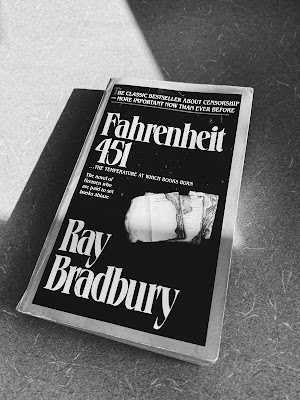An Unexamined Life is not worth Living in Ray Bradbury's, "Fahrenheit 451"
"'Books were only one type of receptacle where we stored a lot of things we were afraid we might forget. There is nothing magical in them, at all. The magic is only in what the books say, how they stitched the patches of the universe together into one garment for us.'"
Dearest Readers,
I cannot believe it's been almost four months since I last posted! After long and rather unusual semester back at school, I have finally found the time to once again pick up a book for leisure. To kick off my rather long list of Winter-break reads, I chose a novel I've been meaning to crack open for several years now: Ray Bradbury's infamous Fahrenheit 451. I was already fairly familiar with the general storyline of this book, but nevertheless took it upon myself to further discover what this renown piece of modern American literature was really all about.
"'What is there about fire that's so lovely? No matter what age we are, what draws us to it?...It's perpetual motion; the thing man wanted to invent but never did.'"
On face value, Fahrenheit 451 is merely a satirical commentary on government oppression through censorship, most notably displayed through the egregious practice of book-burning which is more or less at the center of the book's plot. Going beyond that however, one realizes that the novel also offers a rather philosophical observation on the state of humankind, and its impact on the way in which we collectively choose to structure our society.
"'Cram them full of noncombustible data, chock them so damned full of 'facts' they feel stuffed, but absolutely 'brilliant' with information. Then they'll feel they're thinking, they'll get a sense of motion without moving. And they'll be happy, because facts of that sort don't change. Don't give them any slippery stuff like philosophy or sociology to tie things up with. That way lies melancholy.'"
Functionally, books are far more than a potential source of inspiration for resistance movements. The antagonistic forces in the novel instead argue that reading forces one to go outside of their intellectual comfort zone. By presenting individuals with new ideas, which can challenge belief systems and provoke questioning, books force one to ponder the myriad of uncomfortable truths that exist in our broken world.
This higher level of thinking has the ability to produce, pain, disquiet, and even sadness, which are to be avoided at all costs to ensure a pleasant and seemingly happy life. TV's, which in the novel do serve as a government tool for brainwashing and censorship, also and perhaps more importantly act as a distraction and a source of comfort for the masses. How often in our own world today have we found ourselves using our cell phones and social media platforms for the very same purposes---an escape from mundane reality, or a diversion from that which produces anxiety and grief?
In reading this book I was personally convicted, and not just in the stereotypical cliché of "TV bad, book good". Rather than simply calling individuals away from their devices, this novel challenges one to live in the moment, and truly savor all that life has to offer. There is a strong thematic emphasis on the act of remembrance in this book, which arguably can only be best achieved by stilling oneself to grapple with life in all its complicated intricacies. In an age dominated by perpetual motion and a seemingly endless cacophony, perhaps we would all benefit from pausing to relish in the beauty of a thoughtful, albeit complex, existence that is ours for the taking.
"'Stuff your eyes with wonder...live as if you'd drop dead in ten seconds. See the world. It's more fantastic than any dream made or paid for in factories. Ask no guarantees, ask for no security, there never was such an animal. And if there was, it would be related to the great sloth which hangs upside down in a tree all day, sleeping its life away. To hell with that...shake the tree and knock the great sloth down on his ass.'"


Nice review! I hope to read this some day.
ReplyDelete